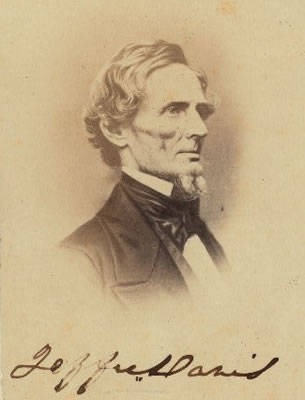

President Jefferson Davis did not approve General Orders, No. 14 until March 23, 1865, which authorized slaves into Confederate States Army military service. However, this measure was too late because Confederate General Robert E. Lee surrendered on April 9, 1865 at Appomattox Court House.
Regardless, history demonstrates that a few Confederate Generals allowed some slaves and freedmen to engage in service with the Confederate States Army in various capacities despite President Jefferson Davis' official stance (1861-1864) on African-American military enlistment. In addition, there are other facts which are not widely publicized.
If President Abraham Lincoln is known for the Emancipation Proclamation, what are the most important contributions of President Jefferson Davis and/or the Congress of the Confederate States of America to African American History?
African-American musicians received the same compensation as white musicians in the Confederate States Army during the War Between the States. Reference the Public Laws of the Confederate States of America Chapter XXIX - An Act for the payment of musicians in the army not regularly enlisted. (Approved April 15, 1862)
The Confederate Patent Act (1861) Section 50 acknowledged a slave to be the original inventor of patents. Reference page 89 in the book ">A hammer in their hands" for this Black history and Confederate history fact.
Jefferson Davis delegated the appointment of chaplains to Confederate States Army field commanders. The first noted African-American "honorary" chaplain of the Confederate States Army was Louis Napoleon Nelson who was appointed by the 7th Tennessee Cavalry field officers during The Battle of Shiloh (April 1862). Based on this date, Louis Napoleon Nelson was the first African-American chaplain to serve during the American Civil War.
In September 1863, Henry McNeal Turner, pastor of Israel AME Church (Washington D.C.) became the first Union African-American chaplain of the First (1st) United States Colored Troops (USCT).
The account of Louis Napoleon Nelson's appoint as chaplain is documented in the Religious Herald (September 10, 1863) which is available on microfiche. The article reads:
 "To the Confederate army goes the distinction of having the first black to minister to white troops: 'A correspondent of the SOLDIER'S FRIEND mentions a Tennessee regiment which has no chaplain; but an old negro, 'Uncle Lewis,'' preaches two or three times a week at night. He is heard with respectful attention -- and for earnestness, zeal and sincerity, can be surpassed by none. Two or three revivals have followed his preaching in the regiment. What will the wise Christian patriots out of the army, who denounce those who wish to see competent negroes allowed to preach, as tainted with anti-slaveryism, say with regard to the true Southern feeling of that regiment, which has fought unflinchingly from Shiloh to Murfreesboro?'"
"To the Confederate army goes the distinction of having the first black to minister to white troops: 'A correspondent of the SOLDIER'S FRIEND mentions a Tennessee regiment which has no chaplain; but an old negro, 'Uncle Lewis,'' preaches two or three times a week at night. He is heard with respectful attention -- and for earnestness, zeal and sincerity, can be surpassed by none. Two or three revivals have followed his preaching in the regiment. What will the wise Christian patriots out of the army, who denounce those who wish to see competent negroes allowed to preach, as tainted with anti-slaveryism, say with regard to the true Southern feeling of that regiment, which has fought unflinchingly from Shiloh to Murfreesboro?'"
Based on a September 1893 New York Times article and the slave transcript of George Johnson from the Library of Congress (Washington, D.C.): Voices from the Days of Slavery, Jefferson Davis gave the following slaves these job roles:
| Source | Slave | Duties |
| The New York Times September 17, 1893 | Ben Montgomery | President Davis' Personal Secretary |
| George Johnson (LOC) | Isaiah Montgomery | Bookkeeper |
| George Johnson (LOC) | G. Johnson's grandfather | Blacksmith |
| George Johnson (LOC) | G. Johnson's father | Civil Engineer |
| Site Map |